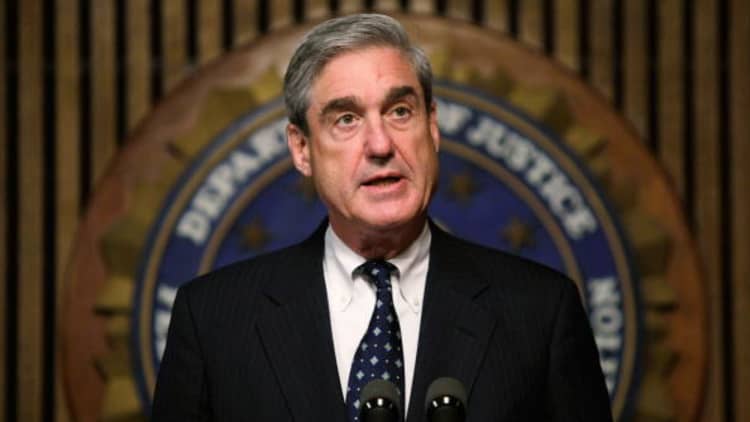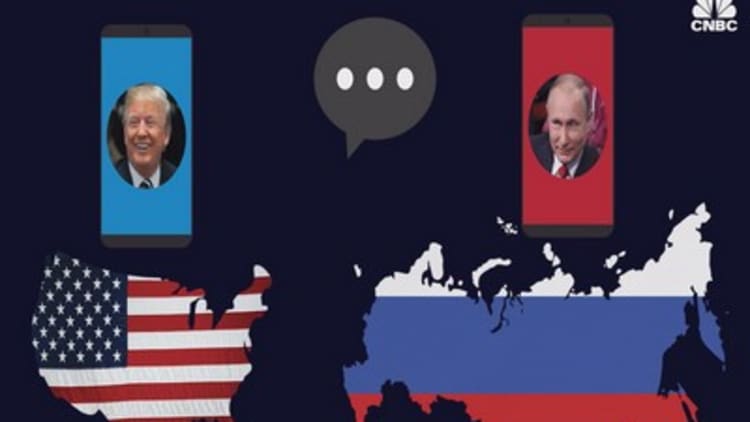Special counsel Robert Mueller's team is requesting that witnesses turn in their personal phones to inspect their encrypted messaging programs and potentially view conversations between associates linked to President Donald Trump, sources told CNBC.
Since as early as April, Mueller's team has been asking witnesses in the Russia probe to turn over phones for agents to examine private conversations on WhatsApp, Confide, Signal and Dust, according to the sources, who spoke on condition of anonymity.
Fearing a subpoena, the witnesses have complied with the request and have given over their phones, the sources said.
While it's unclear what Mueller has discovered, if anything, through this new request, investigators seem to be convinced that the apps could be a key to exposing conversations that weren't previously disclosed to them.
A spokesman for the special counsel declined to comment.

Manafort accused of tampering
The revelation that Trump associates are giving Mueller access to their encrypted apps comes as
Former campaign chairman Paul Manafort is being accused by investigators of tampering with witnesses through the same types of programs.
On Monday, the special counsel filed a claim that Manafort tampered with witnesses after he was indicted in February for money laundering and illegally acting as a foreign agent.
For evidence, a deputy of Mueller's listed two apps, WhatsApp and Telegram, that they say Manafort used to contact the witnesses in his case. The filing also says that those conversations were provided to Mueller in May, a month after witnesses say they were approached to provide their phones.
Representatives from WhatsApp, Signal and Dust did not return requests for comment. A representative for Confide could not be reached.
Encryption to protect privacy
The encrypted applications are used to keep conversations private and give users the ability to have discussions without being monitored.
WhatsApp, for instance, markets itself as a way to securely communicate with people overseas.
"With WhatsApp, you'll get fast, simple, secure messaging and calling for free, available on phones all over the world," the website says.
Dust dubs itself a "safer place to text," and pushes its platform as a way to keep messages secretive as well as giving its users the ability to erase messages off of other people's phones, according to their website.
"All your messages automatically 'dust' (erase) in 24 hours or as soon as they're read – you choose which," the site explains.
Dust was also the app reportedly used between longtime Trump personal attorney Michael Cohen and Felix Sater, a real estate developer who has claimed to have ties to Russian oligarchs, when they tried to complete a deal for Trump Tower Moscow. The plan ultimately fell apart.
Legal experts aren't surprised
It isn't surprising that witnesses are voluntarily giving over possible evidence to federal investigators, experts said.
"It's just more typical for law enforcement to ask for consent for the obvious reason because it's much easier than applying to a court to get judicial permission," said Robert Ray, who acted as independent counsel during the Bill Clinton Whitewater investigation.
He added, though, that it's "not commonplace, but not all that unusual, either," for prosecutors to seek evidence from witnesses' phones.
"There's nothing wrong with asking people to voluntarily provide information to the FBI for whatever investigation," said Michael German, a retired FBI agent and current fellow with the Brennan Center for Justice's Liberty and National Security Program. "And to the extent that that's a voluntary action is where the rub is."
— CNBC's Kevin Breuninger and Tucker Higgins contributed to this report.
WATCH: The Trump-Russia ties hiding in plain sight



